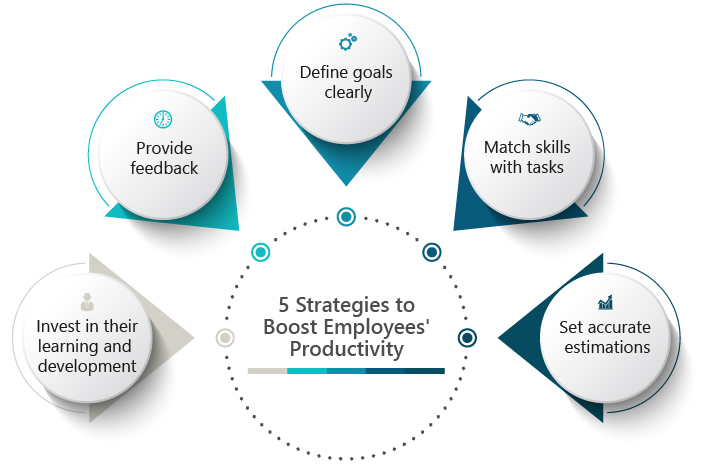Blog Center
Explore the latest stories and insights!

5 Strategies to Boost Employees' Productivity
Date: 2022/04/06
Training | 3.5 MIN READ
How to boost employees’ productivity without keeping a strict eye on them or offering rewards all the time? What’s the secret behind well-functioning teams?
You would probably agree that these are the questions bothering many C-level professionals. The research behind this serves as a solid proof behind this worry; a typical employee is productive for only 2 hours and 53 minutes per day. (Editor’s Choice, 2021) If you are in a managerial position and are reading this now, then do not hurry to panic because things are not lost yet :) We have done research and gathered the top 5 strategies on how to boost employees’ productivity. Let’s dive deeper into each of them!

1. Invest in their learning and development
There is no doubt that employees are the number one driving force of any company, and their combined efforts are the key to long-term business success. For this exact reason it is important to continuously invest in their professional development. This can be easily done by giving employees access to different online training programs that give an opportunity to upgrade their skills, and gain a new knowledge set. Implementing this proficiency in the scope of their job responsibilities will result in higher productivity level because the generated output would be far greater than the invested input.
If you’re looking forward to creating your own training program then this article can be of great help.
2. Provide feedback
Providing feedback may seem like a simple method, but in reality, it is a powerful technique to fill in the gaps of the job, and improve its quality for the next time. By saying feedback, we do not refer to a written formal documentation of employees’ performance. What we mean is a regular daily reflection on the job done by providing some suggestions or giving guidance on how to improve it further. And this two-way interaction should not be only on a manager-employee level, but also within a team to foster ongoing communication and create an environment of open discussion.
3. Define goals clearly
Companies of all types and sizes have predefined goals that they strive to achieve. It is important to have the big picture of where the business is heading to be able to set up short-term and long-term goals, and then break them down into smaller objectives. What matters the most here is that those goals should be communicable to every employee in the company. Doing so will help them to have a better understanding of where their inputs are leading to, and they would feel that their efforts are contributing to strategic goals. This as a result will boost their productivity on a greater scale.
4. Match skills with tasks
Accurate allocation of tasks is something that many of us might not give much importance to, but in reality, it is the core of each departmental operation. Tasks should be matched with the skills that each employee possesses to ensure maximum effectiveness. For example, a person with a creative mindset will do a great job in giving presentations to clients rather than completing a task with strict technical requirements. But if this match is not done accurately, employees can become demotivated because they will think that they cannot perform well, while in reality that specific job function simply does not match their skills.
You can learn more about improving communication in the workplace by having a quick look at this article.
5. Set accurate estimations
In this fast-paced business environment everything is about timeliness. You cannot achieve success if you cannot measure it in a timely manner. That’s why it is crucial to set accurate estimations of the projects to be completed. It will help to allocate resources reasonably to meet the deadlines of all tasks, and ultimately deliver the project on time. Having an accurately estimated time frame would mean avoiding overtime work which could have resulted in productivity decrease.
To sum up, it is quite common to see that the top management realizes the potential of its team but cannot undertake the right strategies to achieve that. Actually, there is no magic formula for boosting your employees’ productivity, all you have to do is correctly implement effective strategies.
Subscribe to Our Blog
You may also like